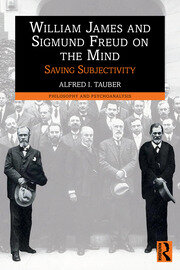William James and Sigmund Freud on the Mind: Saving Subjectivity

Book Details
- Publisher : Routledge
- Published : 2025
- Cover : Paperback
- Pages : 212
- Category :
Forthcoming - Category 2 :
Psychoanalysis - Catalogue No : 97973
- ISBN 13 : 9781032900360
- ISBN 10 : 1032900369
Reviews and Endorsements
Alfred Tauber offers us a lucid and satisfying presentation and comparison of William James’s subjectivism--his study of experience itself—and Sigmund Freud’s contrasting objectivism, in which the mind was understood as an entity separate from the observer. But Tauber is not satisfied with a mere comparison: he shows us why and how these differences have mattered—in both intellectual and social/political life. The book is an eye-opener; it is downright exciting—perhaps especially for psychoanalysts and psychoanalytic psychotherapists. How is it that this comparative study was not tackled until now?
Donnel B. Stern, William Alanson White Institute, New York University Postdoctoral Program in Psychoanalysis and Psychotherapy
William James and Sigmund Freud on the Mind is a startling original contribution, not only to the debates about human psychology and subjectivity, but also to the role that 'American pragmatism' has had in shaping our understanding of the world about us. If the debate seems to be between Freud and James about whether science can define the essence of the human, it is also about how the claims about individual autonomy, often seen as the hallmark of American pragmatism, has come—for good or for ill—to define our modernity. Alfred I. Tauber’s writing is clear and crisp—forcing us to ask how much our understanding of ourselves is embedded in what we define as 'human.'
Sander L Gilman, author of Freud, Race, and Gender
Finally, a long overdue study on the confrontation between James and Freud. As Tauber masterfully demonstrates, Freud’s psychoanalysis was born within a historical epoch that assumed the truth of positivist assumptions, against which James would protest vigorously. James rejected Freud’s “dualistic” approach; instead promoting the primacy of human experience. Their feuding conceptions of the mind animated the development of modern psychology, a division yet to be fully explored. Tauber has now remedied that deficiency.
Dustin J. Byrd, Professor of Philosophy and Religion, The University of Olivet

